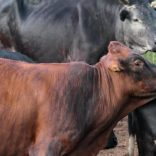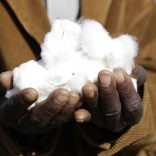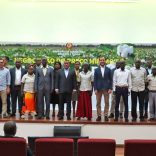They’re on the rise: Could these be the next shooting stars of Mozambique’s exports?
Mozambique: Nyusi launches 2022/2023 agricultural campaign – Watch

Screen grab: Miramar
Mozambican President Filipe Nyusi on Monday launched the 2022/2023 agricultural campaign in Pemba, capital of the northern province of Cabo Delgado.
Nyusi was optimistic about the campaign, because of favourable climatic factors, combined with a rise in the number of farmers, and increased agricultural mechanization.
The number of agricultural producers, compared with the 2021/2022 campaign has risen by 2.1 per cent, said the President. Thanks to the government’s flagship agricultural development programme, Sustenta, the number of households with access to agricultural inputs has grown at a much faster rate – from 189,789 households in the previous campaign to 316,698 now.
Nyusi forecast a rise in the area under cultivation from 5.85 million to 6.2 million hectares, with growth in most groups of crops. Hence, there should be a six per cent rise in the production of grain, 4.4 per cent in root crops,ten per cent in legumes, 12 per cent in oilseeds, and 20.4 percent in vegetables. The country’s livestock herd should grow by 6.5 per cent, including cattle, pigs, and small ruminants.
Nyusi reminded his audience that Mozambique is no longer on the list of countries at high risk of famine.
“In the area of food and nutritional security, 2022 will be marked by the fact that this year Mozambique did not record any pockets of hunger”, he said. “The country was considered stable because we took about 2.6 million people out of food insecurity following the good harvest from the last agricultural campaign. The number of Mozambicans experiencing hunger fell from 9.8 to 7.2 million”.
Despite these improvements, Nyusi believed there is still a long march ahead in the fight against hunger, but he was confident of victory.
As for malnutrition, he said the latest statistics indicate a decline in the number of children under five years of age suffering from chronic malnutrition from 43 to 38 per cent. This, he declared, “consolidates our vision of implanting integrated rural development policies, of production and access to food, water and sanitation, and education”.
Nyusi said the 2021/2022 agricultural campaign had unfolded in an adverse context, marked by uncertainties in the trade policies of the major economies which affected the dynamics of production, international trade and global economic growth. This was largely the effect of the global Covid-19 pandemic.
The Russian invasion of Ukraine led to a breakdown in agricultural exports, “and it is continuing to affect negatively the global food, fertilizer and energy markets”, said Nyusi. “This war has altered the global patterns of trade, and of the production and consumption of commodities, with an impact on the prices of foodstuffs and on inflation”.
He added that the acts of terrorism in parts of Cabo Delgado province “tried, without success to paralyse totally our productive capacity”.
Despite all adversities, Mozambican agriculture had performed robustly. In the previous campaign total production had been 18.3 million tonnes of crops, which was an increase of 8.3 per cent.
Watch the Miramar report.












Leave a Reply
Be the First to Comment!
You must be logged in to post a comment.
You must be logged in to post a comment.